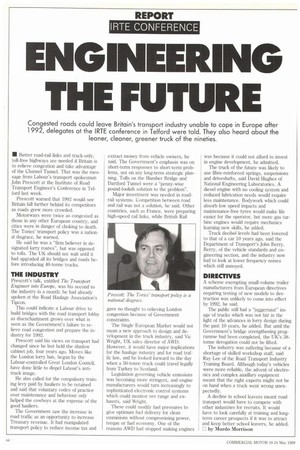NGINEERING
Page 46

If you've noticed an error in this article please click here to report it so we can fix it.
THE FUTUR Congested roads could leave Britain's transport industry unable to cope in Europe after 1992, delegates at the IRTE conference in Telford were told. They also heard about the leaner, cleaner, greener truck of the nineties.
• Better road-rail links and truck-only, toll-free highways are needed if Britain is to relieve congestion and take advantage of the Channel Tunnel. That was the message from Labour's transport spokesman John Prescott at the Institute of Road Transport Engineer's Conference in Telford last week.
Prescott warned that 1992 would see Britain fall further behind its competitors as roads grew more crowded.
Motorways were twice as congested as those in any other European country, and cities were in danger of choking to death. The Tories' transport policy was a national disgrace, he warned.
Ile said he was a "firm believer in designated lorry routes", but was opposed to tolls. The UK should not wait until it had upgraded all its bridges and roads before introducing 40-tonne trucks.
THE INDUSTRY
Prescott's talk, entitled The Transport Engineer into Europe, was his second to the industry in a month: he had already spoken at the Road Haulage Association's Tipcon.
This could indicate a Labour drive to build bridges with the road transport lobby as disenchantment grows over what is seen as the Government's failure to relieve road congestion and prepare the industry for 1992.
Prescott said his views on transport had changed since he last held the shadow cabinet job, four years ago. Moves like the London lorry ban, begun by the Labour-controlled Great London Council, have done little to dispel Labour's antitruck image.
He also called for the compulsory training levy paid by hauliers to be retained and said that voluntary codes of practice over maintenance and behaviour only helped the cowboys at the expense of the good hauliers.
The Government saw the increase in road traffic as an opportunity to increase Treasury revenue. It had manipulated transport policy to reduce income tax and extract money from vehicle owners, he said. The Government's emphasis was on short-term responses to short-term problems, not on any long-term strategic planning. Tolls on the Humber Bridge and Dartford Tunnel were a "penny-wise pound-foolish solution to the problem".
Major investment was needed in roadrail systems. Competition between road and rail was not a solution, he said. Other countries, such as France, were preparing high-speed rail links, while British Rail
gave no thought to relieving London congestion because of Government constraints.
The Single European Market would not mean a new approach to design and development in the truck industry, said Vic Wright, UK sales director of AWD. However, it would have major implications for the haulage industry and for road traffic law, and he looked forward to the day when a 50-tonne truck could travel legally from Turkey to Scotland.
Legislation governing vehicle emissions was becoming more stringent, and engine manufacturers would turn increasingly to sophisticated electronic control systems which could monitor rev range and exhausts, said Wright.
These could modify fuel pressures to give optimum fuel delivery for clean enunisions without compromising power, torque or fuel economy. One of the reasons AWD had stopped making engines was because it could not afford to invest in engine development, he admitted.
The truck of the future was likely to use fibre-reinforced springs, suspensions and driveshafts, said David Hughes of National Engineering Laboratories. A diesel engine with no cooling system and reduced lubrication needs would require less maintenance. Bodywork which could absorb low speed impacts and maintenance-free tyres would make life easier for the operator, but more gas turbine engines would require mechanics learning new skills, he added.
Truck decibel levels had been lowered to that of a car 10 years ago, said the Department of Transport's John Berry. Berry, of the vehicle standards and engineering section, and the industry now had to look at lower frequency noises which still annoyed.
DIRECTIVES
A scheme exempting small-volume trailer manufacturers from European directives requiring testing of new models to destruction was unlikely to come, into effect by 1992, he said.
The public still had a "juggernaut" image of trucks which was not fair in the light of the advances in lorry design during the past 10 years, he added. But until the Government's bridge strengthening programme had been completed, the UK's 38tonne derogation could not be lifted.
The industry was suffering because of a shortage of skilled workshop staff, said Ray Lee of the Road Transport Industry Training Board. Although today's vehicles were more reliable, the advent of electronics and complex auxiliary equipment meant that the right experts might not be on hand when a truck went wrong unexpectedly.
A decline in school leavers meant road transport would have to compete with other industries for recruits. It would have to look carefully at training and longterm career prospects if it was to attract and keep better school leavers, he added. O by Murdo Morrison
































































































































































































